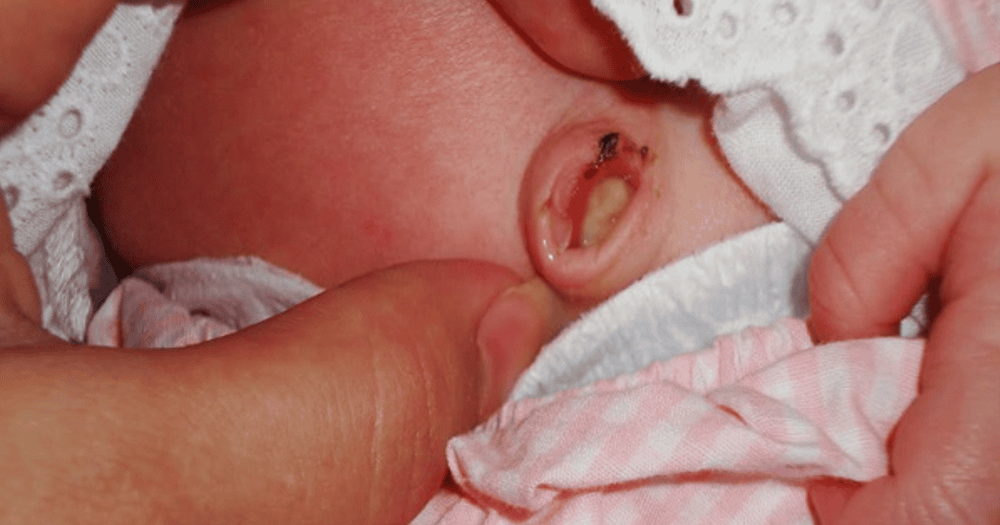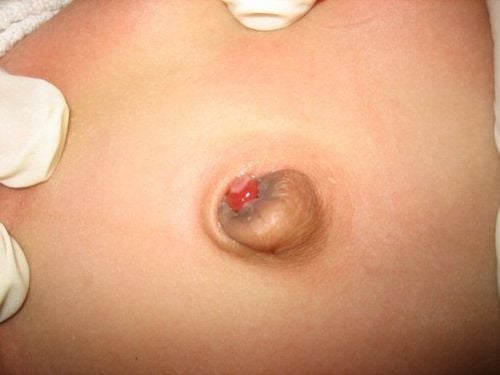This is an automatically translated article.
The article is professionally consulted by Master, Doctor Nguyen Thi An - Pediatrician - Neonatologist - Department of Pediatrics - Neonatology - Vinmec Ha Long International General Hospital. The doctor is a person who is very passionate about health care for children and has experience in successfully treating many umbilical cord infections in babies.The flexible umbilical cord carries nutrients and blood from the mother to nourish the fetus during pregnancy. After birth, the umbilical cord will be clamped and cut close to the umbilicus, leaving the umbilical cord. The umbilical cord usually falls off in one to three weeks after birth. During delivery and clamping, cutting, germs can get into the cord and cause an infection. So what are the signs of an infected newborn navel?
1. Infected newborn navel symptoms
As the umbilical cord dries and heals, it may be brown, gray, or black, which is normal. Or maybe even a little bleeding around the base of the belly button when it's ready to fall and the bleeding will stop on its own or stop faster when you gently press on the belly button.Although light bleeding is normal so parents are nothing to worry about, however, it is important to watch out for signs of an umbilical infection such as:
Red, swollen, warm or tender skin around the umbilical cord Yellow-green pus discharge from around the base of the umbilical cord Bad smell from the cord Baby has a fever over 37.5 c The baby is fussy, irritable, or sleepy The baby's umbilical cord has fallen off but is still wet

Nhiễm trùng rốn trẻ sơ sinh
Therefore, parents need to contact their pediatrician immediately if they notice any of the signs of the inflamed and infected infant navel mentioned above. Babies born prematurely are at increased risk of serious complications due to weak immune systems.
2. What to do when the umbilical cord is wet?
If the baby only has wet umbilical cord without the above signs of infection, parents can rest assured. Babies often get wet when their umbilical cord is wet because a parent or caregiver accidentally gets it wet while bathing or changing diapers. In this case, parents or caregivers need to take the following steps:Use gauze soaked in a little alcohol to clean the navel and use dry gauze to dry the navel after each bath or diaper change. The alcohol will help kill bacteria and make the umbilical cord dry and easy to fall off, researchers say. Parents should note that iodized alcohol should not be used to clean because this antiseptic solution can damage the young cells of the child. Always keep the navel dry and fold the top of the diaper down to avoid covering the umbilical cord. Limit water touching the umbilical cord causing wetting. To let the navel fall off on its own, parents should not touch or intentionally pull the navel. Parents should let children wear loose, dry and clean clothes. If you notice that your shirt or pants are soiled by food or your baby's waste (faeces and urine), it should be changed immediately to avoid infection of the navel.

Khám bệnh cho con tại khoa Nhi - Bệnh viện Vinmec
To visit with experienced pediatricians at Vinmec. Please make an appointment at the website to be served.
Please dial HOTLINE for more information or register for an appointment HERE. Download MyVinmec app to make appointments faster and to manage your bookings easily.
Article referenced source: healthline.com












